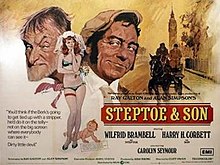Steptoe and Son (film)
| Steptoe and Son | |
|---|---|
 | |
| Directed by | Cliff Owen |
| Written by | Ray Galton Alan Simpson |
| Produced by | Aida Young |
| Starring | Wilfrid Brambell Harry H. Corbett Carolyn Seymour |
| Cinematography | John Wilcox |
| Edited by | Bernard Gribble |
| Music by | Roy Budd Jack Fishman Ron Grainer |
Production company | |
| Distributed by | MGM EMI |
Release date |
|
Running time | 98 minutes |
| Country | United Kingdom |
| Language | English |
| Budget | £100,000[1][2] |
| Box office | £500,000[3] |
Steptoe and Son is a 1972 British comedy drama film and a spin-off from the popular British television comedy series of the same name about a pair of rag and bone men. It starred Wilfrid Brambell and Harry H. Corbett as the eponymous characters, Albert and Harold Steptoe respectively. It also features Carolyn Seymour.
Plot
During a gentlemen's evening at a local football club, Harold meets one of the acts, a stripper called Zita. After a whirlwind romance the couple are married, although the actual wedding ceremony is delayed when Albert, acting as best man, loses the ring somewhere in the yard. They eventually find it in a pile of horse manure, and since they have no time to clean up their arrival in church is met with looks of disgust.
Harold and Zita fly to Spain for their honeymoon, but Albert refuses to be left behind. This causes Harold considerable frustration and begins to drive a wedge between him and Zita. When they are finally left alone and are beginning to consummate their marriage they are interrupted by Albert's cries of distress from the adjoining room, and discover that he has contracted food poisoning from some of the local cuisine.
Harold is forced to fly home with Albert, leaving Zita in Spain. Back home Albert makes a suspiciously fast recovery while Harold waits for Zita to write. When he finally receives a letter from her, the news is not what he had hoped for; after trying unsuccessfully for several days to get a plane back to England she has taken up with a British holiday rep at the Spanish hotel. Harold is heartbroken, and, despite his earlier scheming to get rid of Zita, Albert is genuinely sympathetic.
On meeting Zita again some months later Harold finds that she is pregnant, and she says Harold is the father. Harold offers to take care of them both, but on returning home Albert makes sure that Zita feels unwelcome and she flees. A short while later a baby appears in the horse's stable. This scene parodies the Nativity, with the Three Wise Men bearing gifts replaced by three tramps selling rags, and the Star of Bethlehem being represented by the lights of an airliner.
It appears that the child is Zita's. They name the child after the priest who officiates the christening. Unfortunately for Harold, he is also called Albert. Harold compromises by naming him Albert Jeremy and calling him Jeremy thereafter, although Albert Sr. insists on calling him Albert.
Zita apparently returns and takes the baby back while Albert, who should be looking after him, is asleep. Harold tries to find her and comes across her stripping in a local rugby club where she is soon forced into the scrum of cheering rugby players. Attempting to save her, Harold is beaten up and is only rescued when Zita's musician saves him. Hustled into a back room he hears a baby's cries but when he pulls back a curtain a mixed-race baby is there instead. It turns out that Zita and her musician, who is black, are now a couple. Harold then learns that he is not, after all, the father of her first child.
Cast
- Wilfrid Brambell as Albert Steptoe
- Harry H. Corbett as Harold Steptoe
- Carolyn Seymour as Zita Steptoe
- Arthur Howard as Vicar
- Victor Maddern as Chauffeur
- Fred Griffiths as Barman
- Joan Heath as Zita Steptoe's mother
- Fred McNaughton as Zita Steptoe's father
- Lon Satton as Pianist
- Patrick Fyffe as Arthur (as Perri St. Claire)
- Patsy Smart as Mrs. Hobbs
- Mike Reid as Compere
- Alec Mango as Hotel Doctor
- Michael Da Costa as Hotel Manager
- Enys Box as Traffic Warden
- Barrie Ingham as Terry
Reception
The film was popular at the box office and made a profit of five times its cost.[1][2]
References
- ^ a b Alexander Walker, National Heroes: British Cinema in the Seventies and Eighties, Harrap, 1985 p 114
- ^ a b NAT KING COHEN: To the cinema-going public he is the name at the start of the credits, But to the industry he is a dominant force in production, dustribution, and exhibitionMurari, Tim. The Guardian (1959-2003) [London (UK)] 17 Nov 1973: 9.
- ^ Ooh, you are awful, film men tell Tories.David Blundy. The Sunday Times (London, England), Sunday, December 16, 1973; pg. 5; Issue 7853. (939 words) - this article Cohen says the budget was £200,000.
